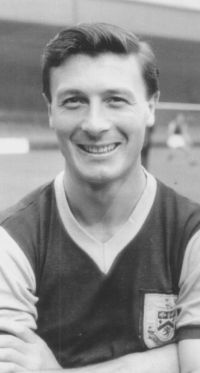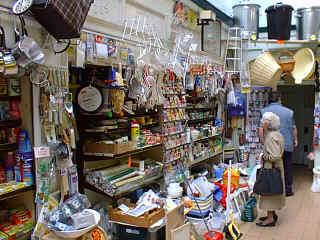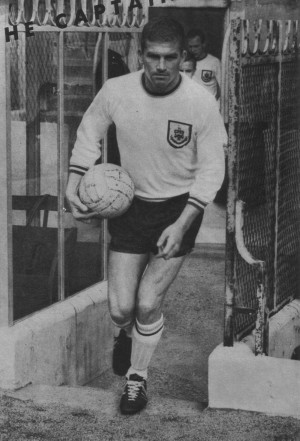|
Is there any cure?
My father is to blame I suppose. We lived in Todmorden, a place then that was all grimy mills and terraced rows, the marshy valley of the fox, it means, and from there in the little old banger we had, an ancient Ford Prefect, Ford Perfect I used to call it although it was anything but, it was a forty minute journey to Turf Moor.
We parked on Mizpah or Lebanon Street where there was always room to park because most people came on the buses, and the council anyway hadn't invented things like double yellow lines and surly traffic wardens. And maybe then in those nostalgic times people didn't look out of their windows to watch and then phone up the nearest warden to come and slap a ticket on your windscreen.
This little car, it only had three gears and reverse, it only touched 50 going downhill, chugged along the Cornholme Valley, up through the Cliviger Gorge, up by The Kettledrum and then down to Turf Moor. As we lurched along there was always that sense of anticipation and excitement because we sat there thinking Jimmy Mac would surely win us the game, and he inevitably did, or so my rose-coloured glasses tell me. It was in those early days that the seeds of claret loyalty were sown, and the foundations of this life long suffering. Bless that car though; it even made it to the South of France one year, and more surprisingly back again.
If Jimmy Mac was my hero, my father always reserved his admiration for Bob Lord. They were just about the same generation, give or take a few years, with the same values I guess. “There's Bob Lord in his pork pie hat,” he'd say to me and point across from our Longside spot to the stand opposite, and in his voice was the sound of admiration-from-afar that signified his deep appreciation of this man.
If Bob Lord's name was in the paper, which it frequently was, pater would ruffle the broadsheet and announce, “Ee, he's in the paper again, but it's all good publicity for Burnley.” But did my father know that the Cobbold brothers, who presided over Ipswich Town, always with a few drinks, called Bob Lord Bollock Chops? At the Savoy dinner to celebrate the Ipswich Championship in 1962, Lord was present and had to make a speech in which he begrudgingly congratulated them but added that they had only won it because Burnley had thrown it away. Cobbold and manager Ramsey neither smiled nor clapped, unusual for the Cobbolds, quite normal for Ramsey. During the evening, Lord made good use of his deafness on a number of occasions when either of the Cobbolds tried to speak to him.
When, at last, the Lord above, took the Lord below, to his bosom in 1981, my father showed me the paper, announcing: “There'll be problems now. He was a great man. What's going to happen?” Then he was silent: deep in thought for half the day.
My father was a teacher in Todmorden, in an age when a teacher was still a pillar of the community, respected and known to just about everyone. It caused me some grief I have to say. Everyone wanted to duff up the teacher's son. Many a lout, who suffered in his classroom from his Victorian ways, and insistence on learning tables, nowt wrong with that by the way, took it out on me. And in a small town there was nowhere to hide. I grimaced and put up with it, and if they weren't twice as big, fought back. Sometimes they were just too big so I ran. Sometimes they were girls; I could handle that.
They say, once a Calder Valley man, always a Calder Valley man, and undeniably this is true. The man might get out of the Calder Valley but you won't get the Calder Valley out of the man. Then, it was a dark, dank place, unattractive and gloomy, although we roamed the hills, made dock pudding and collected bilberries. The station was my favourite place in those pre-Beeching days of steam trains and snorting engines and the line branched off to Burnley. It was set up above the town at the end of the great viaduct and from it you could look across the valley. Across the road was the Queens Hotel which Burnley players sometimes frequented and of course this was the station where many of the young lads used to land to be taken then by car across to Burnley by Albert Maddox.
|
The place has nothing to make it famous save perhaps that it hit the news when it was revealed that the infamous Dr Harold Shipman began his doctoring career and for sure disposed of his first victims there. Oh, and there was a murder at the vicarage in 1867. The vicar refused to let Miles Weatherhill see Sarah the cook. So Miles topped the vicar. The boyfriend did it… in the study… with a dagger… or a candlestick… and thus Cluedo was invented.
Plus it is the UFO sighting capital of the UK and one policeman was mysteriously whisked up into the heavens by an alien species, or so the copper claimed. A lot of people have seen strange lights in the sky and strange things in the daytime. But then it's that kind of place. Our little town was always way ahead of Steven Spielberg.
The town's most famous writer/eccentric was William Holt who bought himself a horse called Trigger from a rag and bone man and then wandered round the town with it selling his books, Holt's books that is, not the horse's. People loved the horse but generally avoided buying the books. Holt had various European forays and also served 9 months in prison for some social protest that he made. God knows what happened to the nag. I can well remember him riding round the streets in the austere 50s, and in an age of drab conformity and shades of grey, he was a welcome splash of adventure, colour and mystique.
To our amazement he had been to Spain, and this in an age when it was an adventure to go as far as Blackpool in Wakes Week. He was on telly one day as well, when a telly was a flickering black and white thing that only the lucky few had, and that sealed his fame. My father I have to say was one of the few people who bought his books. They looked pretty dull to me so I bought Charlie Buchan's Football Monthly and when people like Pilky, Colin McDonald or Ray Pointer were on the front they assumed a special extra value. And now I buy them on Ebay. Sad
Todmorden Grammar School produced the usual collection of Nobel prizewinners and I did read somewhere that Tod GS produced more such winners than Eton. Sadly the class I was in was labelled the worst the school had ever had but somehow we scraped together enough results to make us into teachers, physicists, musicians, bankers and civil servants. One of our gang became a millionaire. Another has a house in Spain. Just goes to show, never believe school reports.
|
But what I remember most about those halcyon days was that they coincided with Burnley's greatest years and European triumphs and we talked for hours about that glorious team, playing for the school team on Saturday morning and then off to the match at Burnley in the afternoon, be it first team or reserves. One game in particular sticks in the memory and I can even remember the room we were in before lessons began. For some reason that morning, we had to congregate in the Domestic Science Lab, and we had newspapers with us telling us of how Burnley had disposed of Reims in the European Cup, losing the game in Paris but with John Connelly's wonder goal winning the tie on aggregate. Podge was outraged that French photographers were leaping onto the pitch and blinding goalkeeper Adam Blacklaw with their flash bulbs, and that fans and police had roughly manhandled manager Potts when he ran on to the pitch because the cheating Frogs were stealing yards at free kicks.
Half the town used to trek to Burnley on a match day, mostly in dark green double decker buses and a long line of them parked along Burnley Road near the railway arches by the market and all loaded up with eager supporters. Those were the days of 26,000 for a normal game and 50,000 for a big cup game. Now, not one football special makes the journey and therein is the visible symbol of the decline of Burnley Football Club. When I passed through the last time on a Saturday and saw just one lad dressed in his claret shirt waiting at the bus stop, it just looked… pathetic… is the only word I can think of.
College beckoned after Grammar School, and even there the Burnley fame had spread. We had football coaching in the PE sessions and the PE tutor must have known his football. “Have we any Burnley supporters here?” he asked. I put my hand up and grinned. “Mr Thomas (things were very formal in 1963) will be able to help with this, he's a Burnley fan.” We then demonstrated the neat little triangular wall-pass moves that were a Burnley trademark and were used in every game, usually down the wings. And then, the tutor, whose name I recall was Ernie Wright, extolled the virtues of little Burnley, McIlroy, Connelly, Adamson and all.
I still pass through the town on an almost weekly basis, still like to find an excuse to visit, buy the local paper, or browse through the football books in Victor's Border Bookshop on Halifax Road. Sometimes I'll wander round the indoor market and buy some Creamy Lancashire cheese. I swear I can feel the presence of my long deceased grandmother wandering round the place.
Roots. Your football team. You can't forget them. For you they are the heart of football. You can never abandon them. There might be intervals when you move away, but the tie is still there. It makes us more than ‘clients' or statistics, or entries on a database. If football is moving as a business into the twentieth century, I'll always think that the heart of football lies in concepts well away from that. You can't quantify emotion and belonging, on a database.
There is no cure for you and me. That's the bad news. But the good news is, it's an affliction for which we don't particularly want a cure. The heart of football remains human; it's a people thing, the daftness of wearing Custard shirts, the pride in raising Year Of The Youth money, it's comradeship, memories, oneness, travelling, images, father and son, passion, emotion, and a sense of belonging.
Bless you father, when you left this earth I was less than impressed when you left me a pair of pyjamas, some shoes that didn't fit, and a watch that didn't work. But you took me to the Turf. So for that, bless you.


